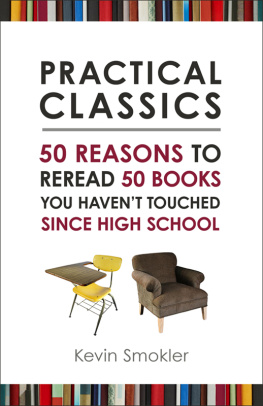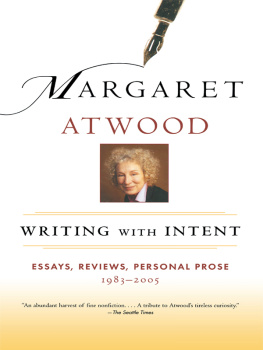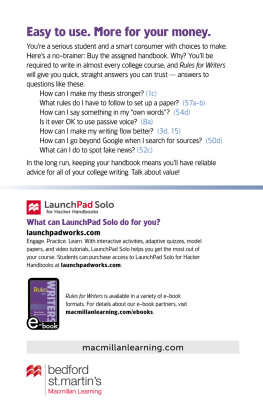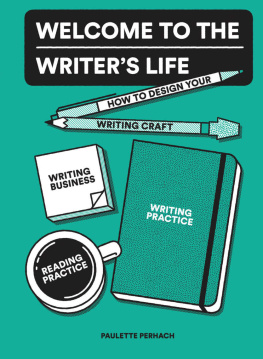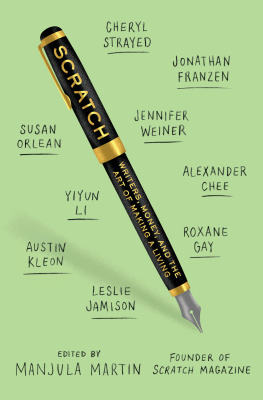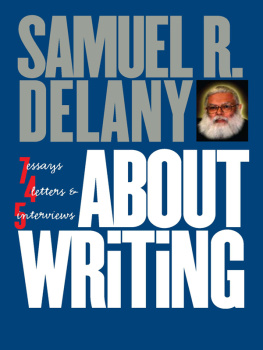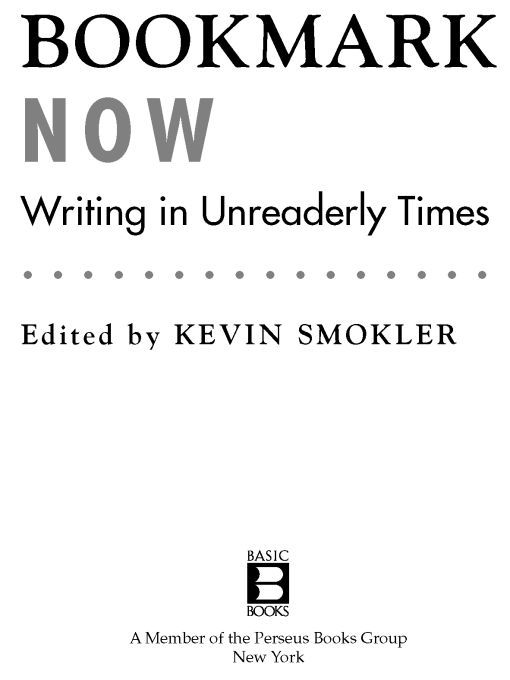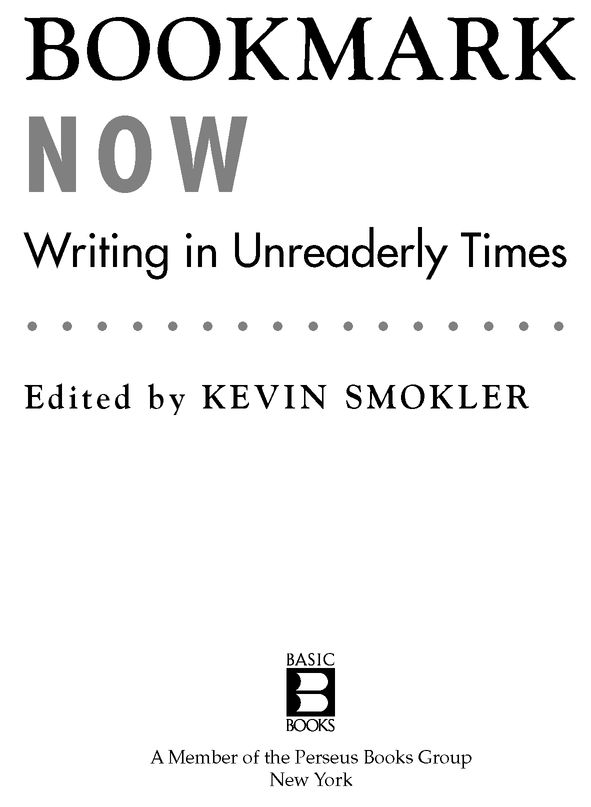Table of Contents
For my Uncle Barry,
who I know writes alongside me.
INTRODUCTION:
THE FUTURE IS NOW
In June 2004, the National Endowment for the Arts warned every book lover in America that the sky was falling. Publishing a report entitled Reading at Risk, the NEA concluded, from twenty years of data and a sampling of nearly seventeen thousand subjects, that literary reading (defined as anything fictional, including novels, plays, short stories, and poetry) had dropped sharply across every age, ethnic, economic, and geographic group in the nation. America can no longer take active and engaged literacy for granted, declared NEA chairman Dana Gioia. If nothing changed, he warned, a well-read citizenry would be a thing of the past, a vast cultural impoverishment the result. Although Chairman Gioia stressed that the crisis had no single solution and no single cause, the report didnt waste any time noting that as rates of reading slid, consumption of television, video games, and online media were swelling menacingly like a tumor on Americas cultural consciousness.
All month long the report winged its way across newspapers, public radio airwaves, online discussion boards, and literary weblogs. Judgments were swift. Nobody brought up Reading at Risk and then said, I need more data before I can tell you what I think. If you loved books, you either (a) were shocked, or (b) figured the NEA was simply saying what you had known all along. Given a minute, you probably said, (a) Something has to be done, or (b) Nothing can be done. Example A: Mitch Kaplan, owner of Miamis Books and Books, one of the countrys most successful independents, called the report our call to arms. Example B: In an imperious op-ed in the New York Times, writer Andrew Solomon bellowed that a crisis in reading is a crisis in national health.... A crisis in reading is a crisis in national politics, then proposed no solution. No, wait; he did: To encourage that great thrill of finding kinship in shared experiences of books. Like no one had thought of that yet.
I took a lot of calls and e-mails about the report that month and tried to stay true to my initial reaction. It made me sad. But something beneath that disappointment stunk up the joint, double-talk that proclaimed us to be living in a new kind of nightmare for American literacy while blaming the same old bogeymen. If online reading was eating away at book reading, how did we explain literary weblogs that commanded thousands of readers a day, or book recommendations and dialogue as crucial features in the next generations of social software? If young people were reading less than any other demographic group, how did we dismiss the revolution in young adult literature brought on by J. K. Rowling and Lemony Snicket, or the best-selling careers of twenty-something favorites like David Sedaris, Nick Hornby, Zadie Smith, and Jonathan Safran Foer?
I didnt quibble with Reading at Risks findings or methodology, since Im not a statistician and the what of the report seemed more salient than the how. But I didnt at all like the collective reaction from the media that viewed the report as a national emergency and the solution as a tsktsk. Were we simply a country of morons fulfilling our insipid destiny? Could we blame sexier, flashier media options with which the humble book couldnt compete? Those are pat, elitist answers to a complex problem, and Americas reading public, however big or small, deserves better. If many factors are to blame, as Chairman Gioia asserted, surely some come from inside, from the industries and institutions that depend on a healthy reading populace for their very survival and yet seem to be losing more of it every generation.
For starters, its no help that being well read has an enormous image problem in this country, and those who claim to be most bibliophilic are as much accomplice as advocate. We authors give dull, mumbly readings at bookstores and see interaction with readers, at best, as tedious distraction and, at worst, a frighteningly awkward social predicament. Universities, local lecture series, and writers conferences are enablers, presenting writers in hushed, reverent tones, as if they were dangerous animals on safari. When books do show up on television, they are seen as playthings of the affluent (Gilmore Girls), the urbane (Will and Grace), or the middle-aged clad in tweed (CSPANs Book TV). And when was the last time you heard public radio, that vanguard of a well-read America, treat an author like a human being, warts and all, instead of with the quiet deference reserved for an elderly relative at Thanksgiving?
Is it any wonder that the average person, who might consume movies, television, and music with gusto, ignores literature? That they see books as all good and well for the Lexus and latte set but not sexy enough for Saturday night and not real enough for the world of jobs, rent, and fun when you can manage it?
We lusty bibliophiles know that reading, unlike just about anything else, is both good for you and loads of fun. But look at how literature presents itself in public; then say loudly, Where the hell is the fun?
I may have missed it, but not once during the cacophony surrounding Reading at Risk did I see a representative from the publishing industry stand up and take some responsibility. On the one hand, who could blame the publishers representatives? Its not a great business strategy when your market is evaporating to say that you brought it upon yourself. On the other, dire conditions are often the best catalyst for radical, revolutionary ideas. Youd think at least one publisher would seize the opportunity and say that yes, despite all this bad news, we will take the wheel, turn this ghost ship around, and make tomorrow better than today for books.
No one did.
I turned thirty-one this year, and working with books is the only adult job Ive been able to keep. In just under four years of reviewing, analyzing, and creating online communities around contemporary literature, Ive seen Oprah spar with Jonathan Franzen and Dave Eggers turn traditional publishing on its head. Ive seen This American Life do for books what The Daily Show has done for politics, spoken word poets appear on HBO alongside the women of Sex and the City, and authors in their sixties and seventies get turned on to blogging. Ive seen George Plimpton, Gwendolyn Brooks, and Joseph Heller pass on and Zoe, the eight-year-old who consistently wins my local poetry slam, come into her own.
This is an amazing time for books. If reading and literature are in crisis, it certainly isnt one of apathy but one of seismic rumblings of change that will have a profound effect on the future. The world of books will be totally different tomorrow than it is today, and it will happen much sooner than we think. And since Ive never been on time for any trend in my lifenot indie rock, breakdancing, or parachute pantsId rather be at the party now than in an imagined past when a nation read together, authors walked as gods on earth, and publishers went home fat and happy every afternoon.
The writers in this book werent around for this age of literature, if it ever really existed (and I dont think it did). The oldest are in their early forties, the youngest nineteen. They are the second generation to be raised by television, the first to grow up with video games in childhood and the Internet in college. Theyve chosen literary lives not only when the arts offer more lucrative options (club DJ, independent filmmaker, hip-hop mogul) and are doing so when more stimuli and information compete for an audiences attention than at any time in history. Its worth asking why they bother. Even more its worth learning about the state and future of literature from their choices.


